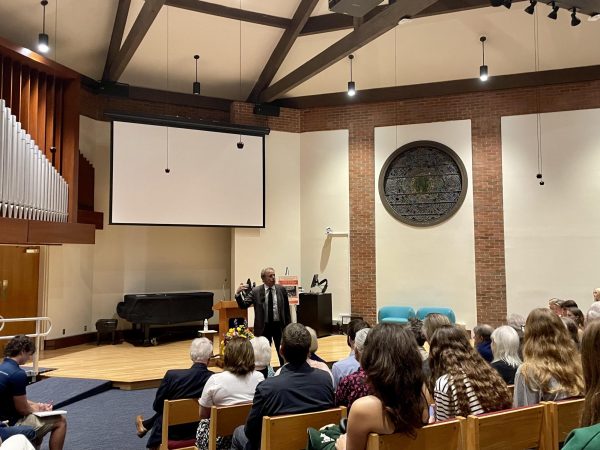
Twenty-year-old Orson Welles’ first-ever production of Shakespeare’s “Macbeth” comprised an all-Black troupe of actors for the Federal Theatre Project in 1936, set in 19th-century Haiti, for exhibition at the Lafayette Theatre in Harlem, New York. White and Black showgoers sat together in sold-out crowds. Even in New York City, desegregated seating was unusual in 1936.
James Shapiro, professor of English at Columbia University and Shakespeare expert, spoke on Oct. 26 about the production of “Voodoo Macbeth” in promotion of his forthcoming book, “The Playbook.”
“[The Playbook] is in part about theatrical playbooks, but it is also about political playbooks, how partisans posture and manipulate to achieve their ends,” Tulane professor of English and local Shakespearean Scott Oldenburg said after the lecture. “The larger argument aims at the machinations that helped discredit and dismantle the vibrant Federal Theatre project.”
The Federal Theatre Project was a short-lived theatre program established during the Great Depression as part of the New Deal to fund live artistic performances and entertainment programs in the United States. During its four-year existence, the Federal Theatre Project staged over one thousand productions in 40 states, seen by 30 million Americans.
“It was seen — this production [of “Macbeth”] — by a staggering number of laborers in America; over 120,000 — first in Harlem, then on Broadway, and then on a national tour that took the all-black cast in cars and pull-train when Jim Crow still ruled,” Shapiro said, adding that the acting company faced adversity to find lodging in the segregated South.
Even in 1936, when Harlem was bursting with Black artistic exploration, Shapiro explained white proprietors still would not hire Black employees in commonplace with white workers. The Federal Theatre Project rejected this practice by hiring Black electricians and carpenters.
While the theatre company was all Black, “Macbeth” was directed by Welles, a white man. Welles is now considered one of the most influential filmmakers of all time, but he did not earn that acclaim without hard work.
At 11 years old, Welles worked on Shakespeare plays in Chicago; at 16, he worked at the Gate Theatre in Dublin. By 18, he was touring, cast as Mercutio in “Romeo and Juliet” and, in 1934, Welles met the 33-year-old John Houseman, who was already highly respected in the theatrical world as an actor, director and producer.
“No one had ever been more trained for that moment than Orson Welles,” Shapiro said.
But with expertise came a drive for perfection. Welles worked, on average, 20 hours a day and once kept his actors in production for 72 hours straight, according to Shapiro.
“Welles was a total tyrant. He would have been drummed out of any rehearsal room today,” Shapiro said. “His rehearsals were absolute pandemonium.”
“[Welles] worked with the Black theatre company on one of its greatest successes,” Oldenburg said. “On the other hand, Welles was brutally exploitative, demanding, among other things, unrealistic amounts of labor from the company without being sensitive to the power dynamics of race involved in his privileged position.”
The Federal Theatre was not allowed to spend any money on promotion due to federal restrictions mandating that the majority of the money go towards labor.
“It couldn’t advertise, so they sent workers out from 125th Street to 120th Street, from Lexington to Broadway to decorate the neighborhood, to stencil [Macbeth] in luminous paint,” Shapiro said.
On opening night, Shapiro said a party band dressed in blue, scarlet and gold marched through the neighborhood with a banner advertising the show. Ten thousand Harlemites gathered around the scene, and both Black and white, uptown and downtown attendees, held tickets to see “Macbeth” be performed for the first time by an all-Black acting company.
Following several of the company’s first performances, white theatre critics attacked the production as not Shakespeare and a waste of taxpayer money. Meanwhile, Shapiro said African-American and most neutral white critics praised the Voodoo adaptation for its energy and excitement. He said part of the key to the play’s success was its melodrama in innovative form.
Shapiro said the Black stagehands struggled to find work for two decades before being admitted to the all-white union. Even the stars of the play, Canada Lee, Edna Thomas, Jack Carter and Eric Burroughs only enjoyed “meager success” for years after “Macbeth.”
While the Voodoo “Macbeth” was a step forwards for Black representation in theater, the company was not immune to the racism and classism still affecting the industry today.


Leave a Comment